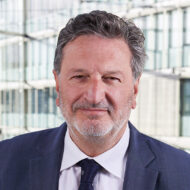A sea-change in African approaches to healthcare
More and more, Africans and their leaders, public and private, can see that good health is a key, perhaps the key, to a healthy and sustainable economy. And that universal health coverage (UHC), quality healthcare for all, can unlock the huge potential of 1.3bn people as I and others heard at the recent World Health Organisation (WHO) Africa Health Forum in Praia, Cabo Verde.
Held under the forward-looking motto, Achieving UHC and Health Security: The Africa We Want to See, the forum set out a road map for governments and their partners, including private sector companies, to “manage and mitigate” Africa’s health needs. But it achieved more than that.
We’re all in this together
Four things struck this “European” observer. First, there has been a sustained sea-change in attitudes towards and engagement with the private sector on the part of both the WHO and (African) member governments. The talk is now of “partnership” and “building relationships based on trust” between all stakeholders – a core message of the body I represented, IFPMA.
Many participants at the Africa Health Forum underlined how ensuring regular supplies of medicines to patients at affordable prices is essential to health security.
Ease of access and building trust is key here as we spelled out in a special G20 health & development partnership report on how innovative partnerships can improve health outcomes. The Access Accelerated program featured in this publication points to a new way of engagement, as it brings together over 20 biopharmaceutical companies committed to tackling the growing burden of non-communicable diseases in low and middle-income countries.
Supporting local health economy
Second, highlighted too by the forum’s own central message of “African solutions for African problems,” there was a strong emphasis on regional and local empowerment and responsibility. While participants wanted to work closely with, say, the major international pharmaceutical companies and gain improved access for Africans to their innovative products, they also wish to see local manufacturers and financial services operators offering state-of-the-art, innovative products via alternative modes of credit.
Our discussions underlined an increasing trend across African countries to see investment in health as key to the continent’s economic progress. One way of building up domestic investment of the local health economy, say, pharmaceuticals, can be technology transfer. Whatever the approach, clearly there is a desire to increase reliability of supply, decrease reliance on imports, train and up-skill and reverse the “brain drain” from LMICs. Building Africa-based local health economy is clearly a key priority.
Youth builds the future
Third, and very encouraging, it is often young people and young women in particular who are leading the way, determined to spearhead the healthcare revolution. I was particularly struck by the Forum’s innovation exhibition that show-cased young Africa innovators. It was great to meet the young entrepreneurs and try out their great ideas; an app to translate treatment information into local Africa languages, another app aimed to help improve adherence for HIV patients in Rwanda, and there was a diagnostic pack to identify neglected diseases.
Dr Moeti’s (Head of WHO Regional Office for Africa) leadership was clearly visible at the event and it was uplifting to see her vision of putting young people and especially women at the heart of this relentless campaign to deliver UHC.
A key constraint on building up local health services that emerged in my own conversations with ministers at the forum is the scourge of counterfeit medicines (‘fake drugs’) that puts millions of lives at risk each year. Here, youth are again stepping up: these young Nigerian women invented a new app to detect falsified medicines, to get to grips with and, one hopes, eradicate this plague of which, according to a recent survey, only 2% of Africans feel properly informed. (To find out more: check out Fight the Fakes, a global campaign to raise awareness of the fake medicines and how they put patients in danger and undermine public health and follow on twitter @FightTheFakes).
Building resilience to eco-challenges
Fourth, the forum was held in the shadow of the recent cyclone to hit Mozambique and neighbouring countries, causing hundreds of deaths, widespread flooding and infrastructural damage – and, unfortunately, growing outbreaks of cholera. Climate change is a huge threat to all the progress Africa has made in healthcare and requires even greater investment and efficient use of resources to deal with emergencies as delegates underlined.
But, for all the health challenges the continent faces, the progress, drive and optimism so palpable at the forum should and will carry over to the UN General Assembly high-level meeting on UHC in September. The mood at Cabo Verde was: “Something is really happening”. And I will be in New York to bear witness to this change – and proclaim our industry’s determination to be partners for change.
As Thomas Cueni, our director-general, put it at the launch of the African global health leadership fellowships: “Our hope is that investing in Africa’s future health leaders will ultimately bring meaningful change, benefiting directly the population while making a stronger case for strengthening its healthcare system.”

Author






